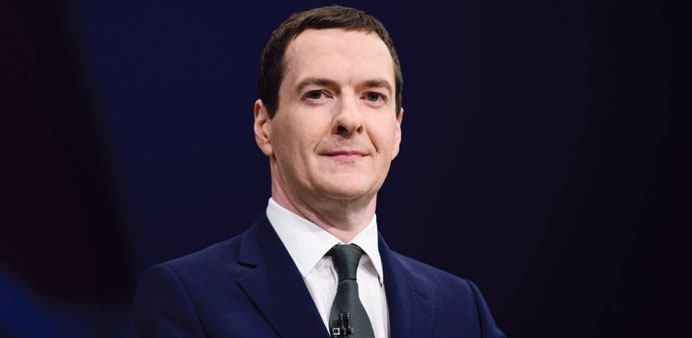Reuters/Manchester
Finance Minister George Osborne, making a pitch to become Britain’s next prime minister, staked his claim to the political “centre ground” yesterday by saying his party was the only option for workers.
Appealing to people who traditionally vote for the left-wing opposition, Osborne also dipped into Labour policy to broaden the appeal of Conservatives, long seen as the party of the rich, and cement their grip on power.
His speech to the party faithful at the annual conference mixed patriotism with the repeated refrain of “we are the builders”, a combination that fuelled expectations that Osborne hopes to buttress his “centrist” credentials to succeed Prime Minister David Cameron, who has said he will step down by 2020.
Hailing the May election which ushered in the first majority Conservative government in 18 years, he told the conference in the city of Manchester: “The lesson of the last five years, and the victory that followed, is that the future favours the bold. So we’ve got to be the builders, the people with the new ideas.”
“We are now the party of work, the only true party of labour and my message to today’s Labour Party is this: you head back to the 1980s, we’re heading forward. You listen to the few, we will govern for the many.”
Osborne criticised Labour, under its new far-left leader Jeremy Corbyn, for abandoning its voters by “heading off to the fringes of the left” and said it was the Conservatives’ chance to prove it could represent their views.
But he also appealed to his party’s traditional voters, promising lower taxes and moving to allow local government more autonomy by allowing them to keep £26bn worth of rates they collect from business.
By unveiling plans to spur infrastructure investment in Britain, he borrowed from one of Corbyn’s main policy pledges.
Osborne said the government would invest £5bn by 2020 and pool local government pension pots into six wealth funds worth £25bn each to invest in vital infrastructure.
He also announced what party members hailed as a “coup”, the recruitment of former Labour cabinet minister Andrew Adonis, a policy chief for Tony Blair, to chair an independent commission to decide where best to put those funds.
Alongside incentives for grandparents to help with childcare, Osborne’s new policies appear designed to address criticism over his austerity drive, and strike at the heart of Labour’s attempts to rally support for its new far-left leader.
Party members said Osborne was stamping his authority on the party. “He’s putting himself very much at the centre of everything that’s happened: our electoral success and the growing economy,” said Helen Harrison, a local councillor from Corby.
Matthew Ashton, a politics expert at Nottingham Trent University, said: “Osborne is presenting himself as Mr. Stability and the architect of economic growth.”
At the weekend, Osborne offered some insights into his personal life in an interview with the right-wing newspaper, the Daily Mail - in what has become almost a rite of passage for future political leaders.
He said he married the woman he had once tried to set up with his friend, had been told by his 12-year-old daughter that he could not go to pop concerts with her and said he is a fan of hip-hop group, N.W.A.
Silent on his upper-class upbringing, he also said he should be sacked if he showed disloyalty to Cameron by lobbying for the leadership prematurely. But pressed on what would happen when that contest arrives, he said: “Let’s ... see how it flies.” In a poll of Conservative Party members conducted by the ConservativeHome website yesterday, 32% backed Osborne as the new party leader. Next placed was Business Secretary, Sajid Javid, on 17%.
Corbyn, who had made one of his main arguments the need to spur investment in infrastructure and housing in Britain, criticised Osborne for making promises he could not deliver.
“There is still nothing to indicate that the Tories understand the desperate need for serious long-term investment in infrastructure - and the real story of their conference remains their attack on working people through the cut on tax credits,” a spokesperson for Corbyn said in a statement.
Osborne has come under fire for arguing that Britain could cut tax credits - a way of redistributing money to low-earning families and workers - because of a higher minimum wage, due to rise to more than £9 an hour by the end of the decade.

